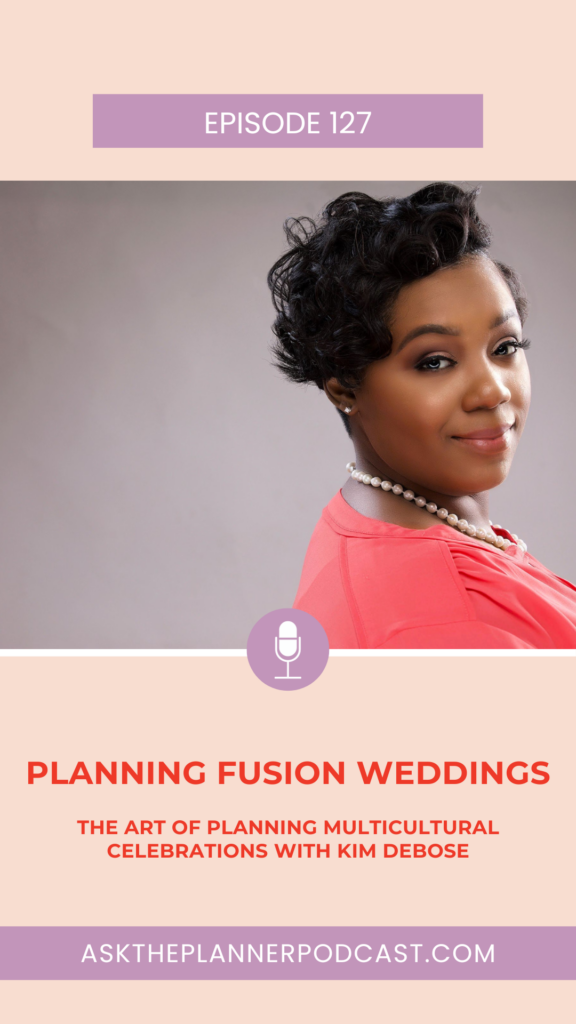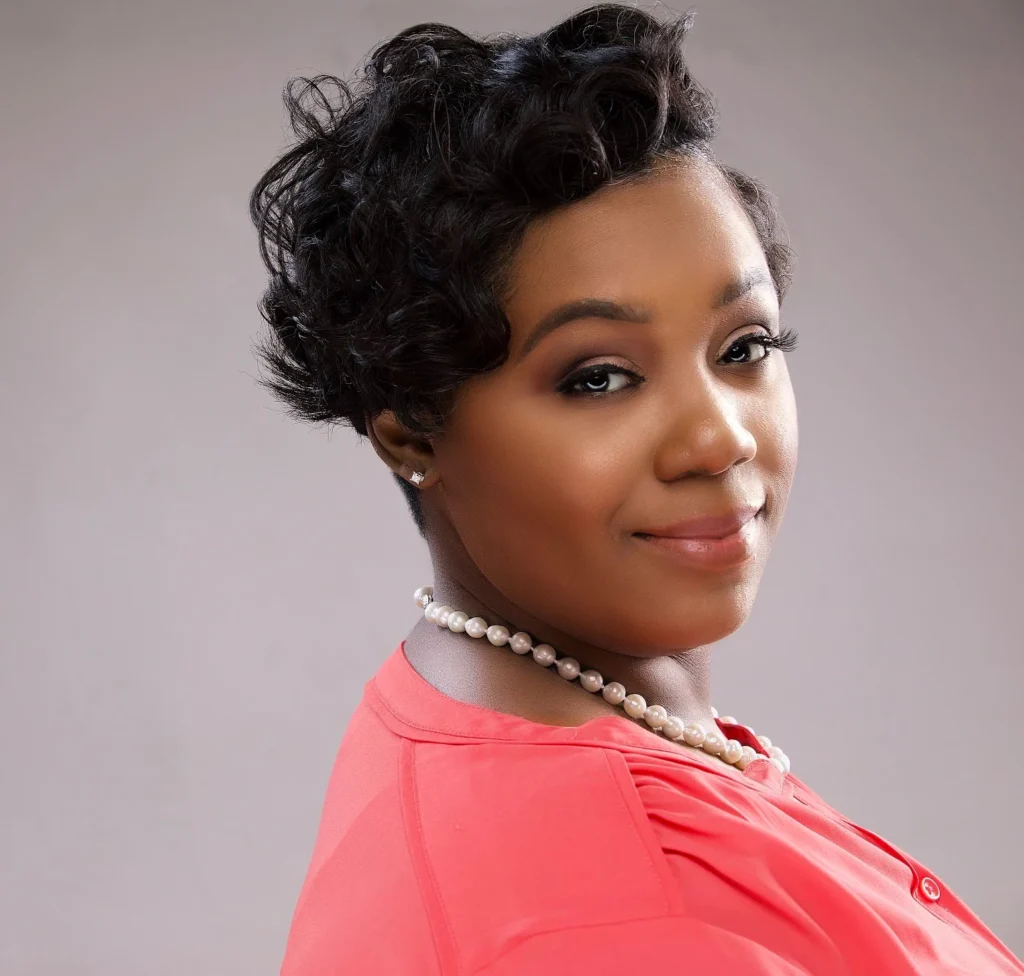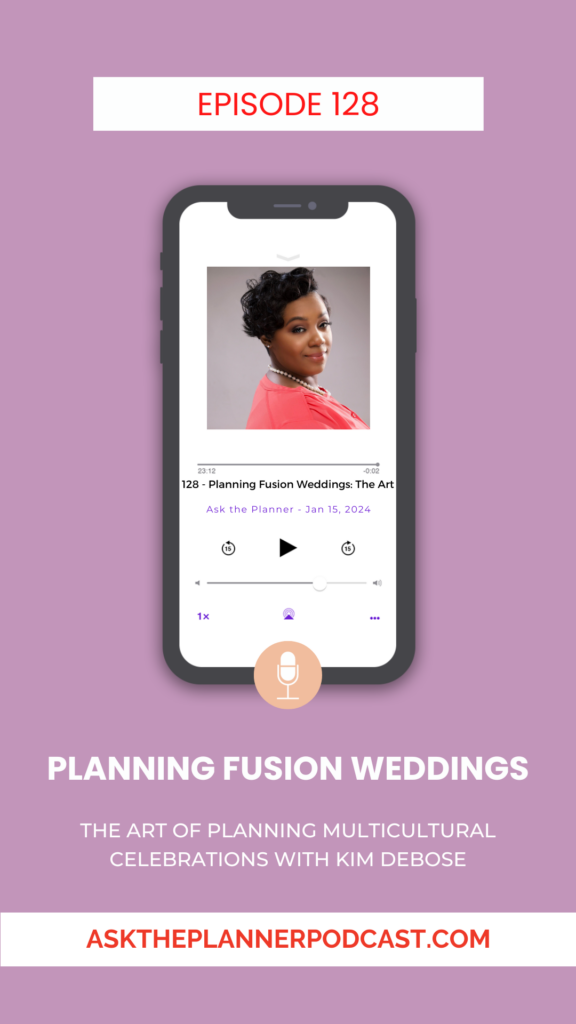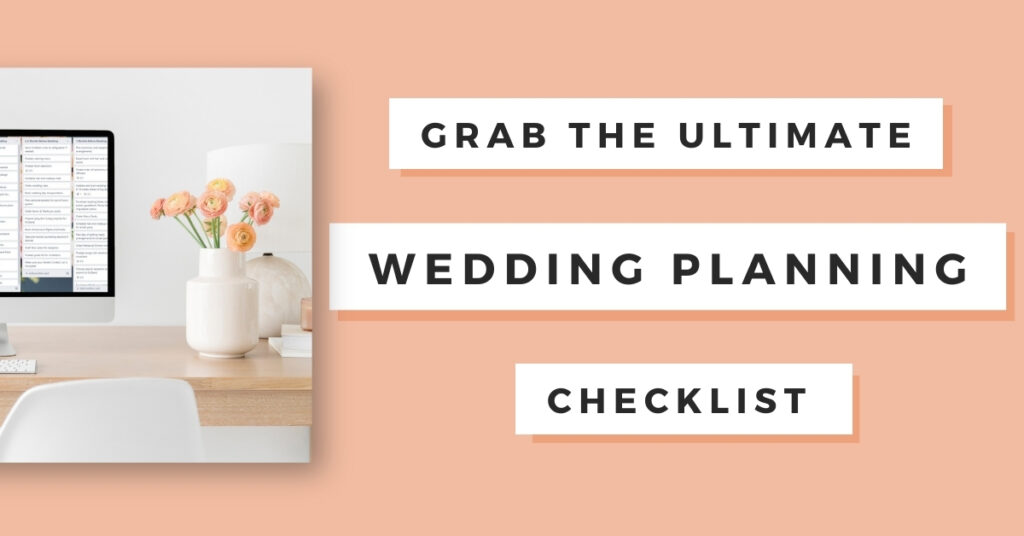In this episode I brought on Kim from Curated by Kim Weddings and Events to talk all about FUSION weddings. If you are in the middle of planning a fusion wedding (or are about to be!), she shares all about the challenges she faces planning them (which I'm sure you can relate to) and the additional events she helps her couples plan too.
Whether you're planning a South Asian wedding, African wedding, Filipino wedding, or any other fusion wedding, there is something in this episode for you. If you want to infuse some more personality and traditions from your backgrounds, make sure you listen to today's episode. I absolutely love Kim's work and passion for fusion weddings, and I can't wait for you to hear today's episode!

LISTEN & SUBSCRIBE ON YOUR FAVORITE PLATFORM
(SEARCH FOR EPISODE 128):
Apple Podcasts | Stitcher | Spotify | iHeartRadio
You can also listen on your Alexa-enabled device. Just ask “Alexa, play the Ask the Planner podcast.”
EPISODE HIGHLIGHTS: Planning Fusion Weddings: The Art of Planning Multicultural Celebrations with Kim DeBose
To fast-forward to a specific part of the podcast episode, check out the timestamps below:
- Defining what a fusion wedding is [4:15]
- Why Kim decided to specialize in fusion weddings [5:27]
- Adding cultural elements to your wedding [8:30]
- What makes fusion wedding planning different [9:41]
- How to budget for fusion weddings [13:45]
- Tips for choosing vendors for your fusion wedding [16:10]
- Logistical challenges you can expect with a fusion wedding [21:08]
- What you should consider before entering the fusion wedding market [25:18]
- Advice for couples who are marrying someone with different cultural traditions [28:54]
- This or That with Kim DeBose [32:58]
- Never Have I Ever with Kim DeBose [33:50]
LINKS MENTIONED IN THE EPISODE
- Learn more about Kim at Curated by Kim Weddings and Events
- Follow Kim on Instagram
- Ultimate Wedding Planning Checklist
- Wedding Day Master Organizer
Who is Kimberly DeBose?
Hi – I’m Kim; I live in Connecticut. I am a New England girl. As the bio said, I love planning and designing events. My mother was a pseudo-wedding planner back in her day. So, I watched her craft events, we had great dinner parties, and she loved hosting, and I just picked up that bug from her. Over the course of my life, I was always the head of the planning committee or prom committee, which really fused together my love of logistics, my love of beautiful design, and just my bossy personality. All of that just led me to the road of wedding planning, and I love it here.

We are so happy to have you here talking to us about fusion weddings! First, how would you define what a fusion wedding is? Is a fusion wedding the same as a multicultural wedding?
Yes! On a cellular level, a fusion wedding is just combining two or more cultures, and then bringing those cultures together into the wedding (from the ceremony to the reception, and throughout the planning process as well). It’s about making sure that all cultures are represented (if that’s what the couple wants) and combining those things in a fluid way. I believe that fusion is now the new “buzzword” for sure, but in terms of the differentiating factors between a multicultural wedding and a fusion wedding, it's just wording. I believe that the title “fusion wedding” is usually used for weddings that have a little more flare in terms of intentionality, scope, and design, but really the terms are interchangeable.
What made you decide to focus on fusion and multicultural weddings as a planner?
Here in Connecticut, I'm about 45 minutes away from Manhattan, and I saw a hole in the market. I was working for a boutique planning firm for one of my mentors, and after working with her for such a long time, I saw once she left the market, there was just no one to serve couples that really wanted to infuse their culture and have a really vibrant wedding.
Typically the weddings here in New England, Massachusetts, and Rhode Island, are all very coastal, with a lot of blues and a lot of ivory. People really lean into that design element, but there happened to be a slew of people who just wanted to have a wedding that would've happened in India or would've happened in Nigeria because that was important to their parents. Typically my clients are first-generation Americans or second-generation Americans. They wanted to pay homage to their culture and wanted their wedding to be vibrant.
Nine times out of ten, I have clients that are of two different backgrounds. Now, how they want to display that comes in different iterations, but typically my clients are South Asian American, Filipino American, Nigerian American, or Japanese American.
Do you find all of your couples want to incorporate their culture into their wedding?
Couples from different cultural backgrounds often approach me, interested in a traditional American wedding but also drawn to the services provided by Curated by Kim Weddings and Events for their logistical and design needs. In such cases, we consult with their family members, including parents, grandparents, aunts, and uncles, to explore incorporating meaningful traditions, such as a Chinese tea ceremony, to enhance their wedding experience.
And then we have a traditional, we call them “white weddings” here, but we decide together as a team in collaboration with their parents and their extended family about what's important for all the guests to see. Typically, the guests are friends of their parents and relatives, so they'll want to see some cultural infusion there. We don't have to go crazy if they don't want to, but the touch is usually appreciated by your family.
I know every fusion wedding is different, but can you share some of the main things that you think are different for different cultures and heritages that you don't typically see at a “traditional” American wedding?
The common thread is typically the number of events that happen during the wedding planning process and during the actual wedding weekend. My clients typically have a rollout where there is some kind of ceremony prior to the actual marriage ceremony, some kind of gathering (of either the entire guest list or half of the guest list) prior to the actual marriage ceremony, and then typically something after.
Our clients typically host a full wedding weekend, which I find to be very unique and just a part of being a fusion wedding planner. So that's what separates those particular weddings from traditional American weddings.
Even though American weddings can have a rehearsal dinner and a brunch the next day, I feel like for each and every one of my fusion clients, there are always ancillary events attached to the formal wedding and reception.
Can you go a little bit deeper into certain types of fusion weddings? What do they typically include?
In particular, for my South Asian clients, their auxiliary events run the gamut, and it all really depends on what part of India they're from (or even if it's India or Pakistan or one of the many adjacent countries). It also depends upon what kind of religion they have. So we have Hindu clients, we have Muslim clients, and those events now become even more specific.
To give you a few examples, a South Asian Hindu wedding would have a Garba night or a Sangeet. The night before the wedding ceremony there would be a Mehndi ceremony for the bride. During that, she has her hands tattooed and her feet tattooed to symbolize fertility, love, and abundance. Then, one of my favorites is the Baraat where the groom typically comes in on a horse, but we've had everything from luxury cars to elephants, and the groom is just celebrated for 90 minutes prior to even entering the ceremony at the specific auspicious time that is given by the pundit or the priest.
For my African clients, we also have knocking ceremonies that happen. We have Nigerian or Guyanese ceremonies that happen traditionally at their home, which I don't always take part in. Immediate family members and aunts handle that because it's very, very cultural and sensitive, but those things still have to be factored into the wedding weekend. A fusion wedding will typically just be really full, robust and busy weekends.
How would you say budgeting for a fusion wedding is different from budgeting for a more typical wedding?
A fusion wedding, typically consisting of three or four parts, requires careful budgeting, akin to managing multiple weddings within one event. Let's take a South Asian Hindu wedding, for instance. During the Mendhi night, extended family members and guests from the groom's side, who are already in town, are welcomed either into the family's home or a hotel ballroom, where they need to be provided with meals. Entertainment, photography, and videography services are still essential to capture those intimate moments. Therefore, a specific budget tailored to this event is necessary. While it may not match the cost of the wedding and reception day, there is still a significant price tag associated with the various elements involved in planning a fusion wedding.
Moreover, it's important to focus on the specific aesthetics and decide whether to reuse items across events. Each part of the wedding often has its unique identity, which may not flow seamlessly throughout the weekend. This depends on factors such as the color palette and the types of flowers required. For example, during the Sangeet, we invest heavily in rentals, create a lounge area, and adorn the space with an abundance of flowers. Sometimes, the sangeet budget exceeds the floral budget for the reception. Ultimately, it all comes down to the priorities of the couple and their parents.
What advice would you give to couples looking to hire vendors for their fusion wedding?
I'm a wedding planner, so I'm going to tell you that you should find a wedding planner first. We are very resourceful. We have the relationships, we know the industry, and most importantly, we understand how to balance a wedding budget. I'll always advocate to find a planner first, and if you are a couple that's planning a fusion wedding, you want to look for a wedding planner that has done this before. This market is very specific, and some costly mistakes can be made if you do not have the right planner on your team.
90% of my clients have parents who are integral parts of the wedding planning process because we are at $150,000 to $500,000 budgets. Their parents are contributing most of the time, so we have to bring them in to make decisions and financial decisions as well.
Thinking of curating your vendors, here are a few things to think about. You need to have a photographer who has a lot of stamina simply because you could have a wedding day that is 15 hours long and with a 90-minute break. You need to have a photographer that knows how to bill for that, and whom understands the significant parts of the ceremony so they can capture that and understand that there are going to be some cultural nuances that he or she needs to know about or be aware about.
Interrupting my episode about fusion weddings for a second…
Hello, everyone. I'm briefly interrupting my interview with Kim to address Fusion weddings. Managing them may seem daunting, but keep in mind that any wedding involves numerous moving parts. That's why we've created the Ultimate Wedding Planning Checklist, a top-seller in our wedding planning template shop for a good reason. If you are currently seeking a comprehensive tool to keep you organized throughout your wedding planning journey, use code PODCAST10 at checkout for a 10% discount on your entire cart.
Do you have any advice or tips for vendors looking to venture into fusion weddings? What unique challenges do fusion weddings typically present compared to more traditional ones?
If you struggle with confrontation, entering the world of fusion weddings may not be the best fit for you. Various elements vie for attention in these situations, particularly if the couple comes from two strong cultural backgrounds. Parents, grandparents, and relatives may assert their opinions vigorously. It's important to possess a strong and assertive character, capable of handling confrontations.
On the wedding day, opinions will be everywhere. You need to be able to confidently stand your ground, making decisions even when faced with challenges. To be candid, as an African-American woman planning South Asian events, I've encountered situations where my cultural expertise was questioned by guests. This can happen in ANY culture when an outsider directs the proceedings. So, a strong personality is a must. Adaptability is also crucial, as is the ability to pick up on social cues, recognizing when a family member should step in and make a decisive call on something that may not align with your personal preferences. Remember, it's a thankless job until the day after the wedding.
What tips do you have for our listeners who are marrying into a new culture or a heritage?
My top piece of advice is for the couple to sit down together and discuss the type of wedding or wedding weekend they envision. Often, I've noticed that when one partner is of Asian descent and the other is Caucasian, Black, or from any American background, they tend to get caught up in the expectations of the South Asian family.
I encourage couples to carefully analyze their priorities, recognizing that some compromise may be necessary. The goal is to create a wedding that truly reflects their preferences. You don't need to replicate what someone's cousin had in the past. Discussing and blending their favorite aspects from each culture's weddings, including ceremonies and receptions, is essential to achieve a fusion that truly resonates with them. Prioritizing these preferences comes right after budget considerations in our planning process.
Anything else our listeners should know about planning a fusion wedding?
I want coules to know that planning a highly logistical wedding can still be enjoyable. There are enjoyable aspects to this process, and I encourage you to fully engage and participate in it, especially alongside the professionals you hire to assist you in the planning stages. The key is to stay unified throughout all the events. I often advise my couples to ensure they share the same perspective and avoid being pulled in different directions. By staying together, you can have a fantastic wedding weekend, and that covers the essential points.
THANK YOU TO OUR PODCAST SPONSORS!
- Wedding Planning template shop Use code PODCAST10 for 10% off!
- Planning a Fusion Wedding? Make Sure You Have Our Ultimate Wedding Planning Checklist
- 1-on-1 Wedding Planner Coaching
QUESTIONS?
If you have any questions, DM me on Instagram at @asktheplannerpodcast, call the wedding planning hotline at 585-210-3467, or drop it in your review on Apple Podcasts.
Also, don’t forget to check out the Wedding Planning template shop, including my new Wedding Day Master Organizer which includes the same spreadsheets we use in our day-of production books.
And for all my planners out there, check out my new wedding planner coaching service! Whether you’re in the first 1-2 years of your business and you don’t know how to increase your prices, build a team, attract your ideal clients, find your brand’s voice, or you’re a little further in your career and you want to take it to the next level with a digital product, start a podcast, or something else, I would love to help you build the dream wedding business you deserve!
Learn more and schedule a call with me to see if this is what your business needs at verveeventco.com/coach.
DON'T FORGET TO SAVE THIS POST SO YOU CAN RETURN TO IT AGAIN!


comments +